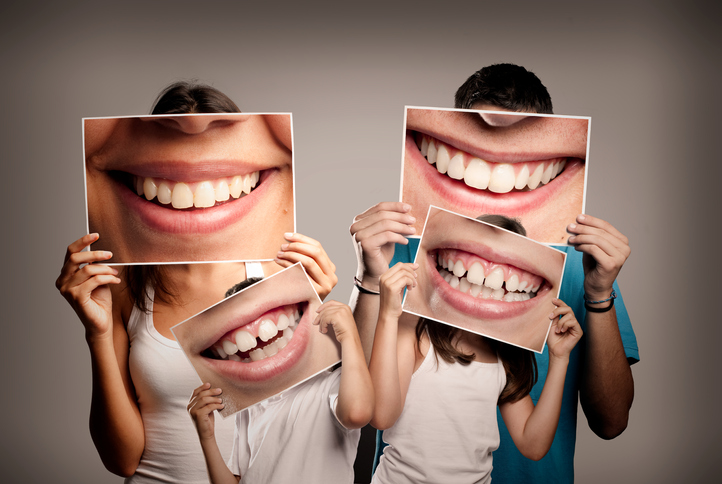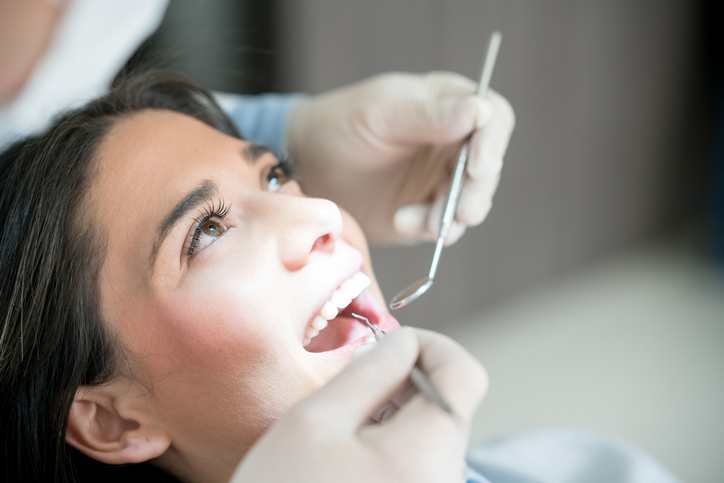-
Restorative Dental Care 101

How much do you know about restorative dental care? Dental professionals use the term “restorative dentistry” to describe the process of replacing or repairing teeth. Today, there are many solutions to dental problems, including crowns, bridges, fillings, and implants. Not only can these products restore your natural smile, but they can also help prevent future problems with your dental health.
How can replacing damaged teeth improve your oral health? First, when the empty spaces in your mouth are filled, your teeth will remain in proper alignment. When your teeth are properly aligned, it’s easier to maintain good oral hygiene, preventing the build-up of plaque that can lead to additional problems. What’s more, dental restoration can improve your appearance, health, and self-esteem.
- If your problem is cavities, you probably need fillings. Your dentist will remove the decay from the damaged tooth and fill the hole with one of several different materials. The materials used in fillings include gold, silver amalgam, tooth-colored plastic, composite resin, or porcelain.
- Sometimes, cavities or broken teeth require crowns. A tooth-shaped cap placed over a tooth, a crown is used to protect and strengthen your tooth structure. Crowns are custom made, based on an impression your dentist makes of your damaged tooth, and cemented in place.
- If you’ve got missing teeth, your dentist might choose a dental bridge to “bridge” the gap. Anchored on each end by a crown, a bridge uses artificial teeth to connect the crowns and fill the space. This can help prevent your remaining teeth from shifting, and a bridge works like your natural teeth.
- A good permanent solution for missing teeth is dental implants. Implants involve two pieces: an anchor and a tooth. The metal anchor is inserted into the jawbone, then topped with a false tooth, designed to look and feel like a natural tooth.
Once your smile has been restored, you can care for your dental appliances just as you would your natural teeth. Brush your teeth at least twice a day, and consider an electric toothbrush to help remove plaque from both the restorative work and your teeth. It’s also important to floss around your teeth, dental implants, bridges, or crowns every day, and use an antibacterial mouthwash to help fight plaque bacteria. Eat a healthy diet, avoiding sugary, sticky foods, and trying not to chew on hard foods that can damage your dental work.
If you need restorative dental care, look to Glenwood Premier Dental, where we believe that a healthy, confident smile is an important part of a happy and healthy lifestyle. Our staff of caring professionals offers a wide range of dental services, working to exceed our patients’ expectations, and provide the best possible service. We offer dental exams and teeth cleanings, teeth whitening, and more, using state of the art technology in a comfortable and friendly environment. If you’re looking for dental care in Hazlet, contact us through our website or call 732.264.4477.
-
Tips for Having Healthy Teeth and Gums

Are you doing everything you can to keep your teeth and gums healthy? Research indicates that the health of a person’s mouth has an impact on a person’s overall health. Without proper care, tooth and gum problems can lead to pain, tooth loss, and diminished self-confidence. Worse, these problems can result in malnutrition, speech problems, and other challenges. The bacteria from tooth decay can even travel to other parts of the body and cause issues like heart disease and other major health concerns. How can you maintain good oral health?
- Brush at least twice a day, correctly. Brushing your teeth is one of the most important things you can do, as long as you’re using the right technique. Using a soft-bristled brush, fluoride toothpaste, and small circular motions, spend two to three minutes brushing the front, back, and top of all of your teeth. Be careful not to brush too aggressively, and replace your toothbrush when the ends begin to fray, about every three months.
- Floss daily. Flossing removes plaque and bacteria from between the teeth, in the places where your toothbrush is unable to reach. Flossing also removes debris and food trapped between the teeth, helping prevent bad breath. Gently push the floss all the way down to your gumline, then hug the side of the tooth with up-and-down motions. Don’t snap the floss up and down, which can cause pain and won’t effectively remove plaque.
- Consider using a mouthwash. Antibacterial mouthwashes and rinses with certain essential oils can be effective in protecting oral health and preventing bad breath. Talk to your dentist about the right mouthwash for you.
- Be smart about what goes into your mouth. Don’t smoke, because this can raise your risk of gum disease and impair your immune system. Eat a healthy diet, limiting sugar and starches, and eating plenty of fiber-rich fruits and vegetables. Drink water instead of sugar-sweetened beverages.
- Teach your children good oral hygiene early. Wipe your baby’s gums with a soft cloth, and teach your children to brush their teeth as soon as they have teeth, brushing the teeth for them until they’re old enough to take on that responsibility. Never share utensils or place a baby’s pacifier into your mouth. Limit sugary foods and beverages, and never let your child take a bottle or sippy cup or milk or juice to bed.
- Make regular dental care a priority. Seeing a dentist every six months for cleaning and a checkup can help prevent dental problems from becoming major issues.
To keep your teeth and gums healthy, trust your dental care to Glenwood Premier Dental, where we believe that a healthy, confident smile is an integral part of a happy and healthy lifestyle. Our staff of caring professionals offers a wide range of dental services, providing excellent care in a comfortable and friendly environment. If you’re looking for dental care in Hazlet, contact us through our website or call 732.264.4477.
-
Are You Battling Bad Breath?

How is your breath? If you struggle with bad breath, also called halitosis, it can be an embarrassing issue that is difficult to control. Sometimes, you can effectively fight bad breath with good oral hygiene, but sometimes the problem is the sign of a more serious health concern, either dental or medical. How can you prevent bad breath and keep your mouth healthy?
- Most of the time, halitosis begins in the mouth. It could be remnants of foods in the mouth after a meal, causing bacteria growth, or it could be that you’ve eaten a pungent food like garlic, onion, or certain spices, which affect your breath while they’re being digested.
- Tobacco can cause bad breath. Cigarettes, cigars, and other tobacco products can cause a foul odor in the mouth. What’s more, when you smoke or otherwise consume tobacco, your risk of oral and other cancers is increased.
- Sometimes the problem is poor oral hygiene. If you don’t properly brush and floss, or you skip brushing your tongue, food particles remain in your mouth. As these bits of food break down, they produce bacterial growth that can cause bad breath and increase the risk of gum disease. Conquering your bad breath may be as simple as brushing twice a day, flossing at least once, and cleaning any dental appliances regularly.
- A lack of saliva can cause halitosis. Saliva helps keep your mouth clean by clearing away food particles, and when your mouth is dry, food particles left behind can cause bad breath. Dry mouth can sometimes be a side effect of certain medications.
- Some health problems cause bad breath. Sometimes, no matter how much attention you pay to your oral hygiene, your breath is still not good. This could be the result of a respiratory infection or inflammation of the sinuses, lungs, or throat. Diabetes, some liver diseases, and kidney disease can also cause halitosis.
The best way to fight bad breath is to brush your teeth, floss, and clean your tongue. If you’re doing all that you can and still struggling with breath that’s not so fresh, talk to your dentist and find out if he or she can prescribe or recommend a special toothpaste and mouthwash. Seeing your dentist regularly is another vital part of preventing bad breath because when you have regular dental appointments, your dentist will be able to catch issues before they become significant problems. If your dentist has ruled out dental issues as the cause of your halitosis, consider seeing a doctor to determine if you have an underlying medical condition.
If you need a dentist, look to Glenwood Premier Dental, where we believe that a healthy mouth is an integral part of a happy and healthy lifestyle. Our staff of caring professionals offers a wide range of dental services, using state of the art technology in a comfortable and friendly environment. If you’re seeking dental care in Hazlet, contact us through our website or call 732.264.4477.
-
Are You New to Dentures?

If you’ve been told you need dentures, you’re not alone. Millions of people have restored their mouths using dentures, beginning a journey towards a new life and a more confident smile. Your dentist will create your dentures based on an impression of your mouth, customizing them based on your preferences and adjusting them as needed to fit comfortably. It may take a little while to get used to wearing your dentures, but the most important thing to know is how to take care of them.
- At first, you’ll need to eat mostly soft foods. This is just until you grow accustomed to wearing your dentures, and after that, you can eat many different foods, as long as you cut them into small pieces to make them easier to chew. It may take a while to get used to your dentures, and that’s normal. Avoid hard, chewy, or sticky foods, like meat, candies, and gum, and limit any firm fruits or vegetables, because these foods can be hard on your gum tissue. Make sure you chew evenly on each side of your mouth and drink water with your meals to help rinse away food particles.
- You will need to clean your dentures daily. As soon as you get dentures, you should establish a daily routine for cleaning them in order to maintain good oral hygiene. You can soak them with a special denture-cleaning tablet to remove stains and kill odor-causing bacteria. You should also gently brush your dentures, using a soft-bristled brush, to be sure you’ve cleaned off any remaining debris.
- Store your dentures properly when you’re not wearing them. Cleaning your dentures is an important part of taking care of them, but so is storing them properly. Any time that you’re not wearing your dentures, they should be placed in a glass of water or denture cleanser solution. This will help to keep them from drying out. It’s also important to keep your dentures out of the reach of children or pets so that they don’t meet with an unfortunate accident.
If you need to restore your smile and you’re considering dentures, look to Glenwood Premier Dental, where we believe that a healthy, confident smile is an important part of a happy and healthy lifestyle. Our staff of caring professionals offers a wide range of dental services, working to exceed our patients’ expectations, and provide the best possible service. We offer dental exams and teeth cleanings, teeth whitening, and more, using state of the art technology in a comfortable and friendly environment. If you’re looking for dental care in Hazlet, contact us through our website or call 732.264.4477.
-
Flossing 101

You hear it every time you go to the dentist: brush twice a day, and floss at least daily. Obviously, you understand that brushing your teeth is necessary to remove food, bacteria, and plaque, but why is flossing so important? We can give you several good reasons to floss your teeth.
- When you floss, you remove plaque and food particles your toothbrush left behind. Your teeth will look brighter after you floss because, just like in the old carpet demonstrations, dirt is being removed that you didn’t even realize was there.
- Flossing can help protect your overall health. An increasing body of evidence links periodontal disease to an increased heart disease risk. This may be because mouth infections increase inflammatory substances in the blood, or it could be because bacteria from your mouth can enter the bloodstream. Whatever the reason, flossing protects your heart by reducing your risk of gum disease.
- When you floss, you get to take a close look at your mouth. There are conditions like cancer, HIV/AIDS, and other conditions, that can create lesions in your mouth and cause your gums to redden and swell. Flossing gets you up close and personal with your mouth so that you can let your doctor know what’s going on.
- Flossing helps protect your gums. When your gums are chronically unhealthy, you are at an increased risk of losing your teeth. Brushing twice a day is extremely important to your oral hygiene, it may not be enough to protect you from gum disease and the resultant tooth loss. Flossing provides an extra layer of protection.
- When you floss, you improve the health of your gums. You may be reluctant to floss because you have sensitive or bleeding gums, but in fact, flossing can make your gums healthier and help prevent bleeding.
- It’s never too late to start flossing. No matter when you start, you can improve your oral hygiene and the health of your gums. Flossing, combined with brushing and rinsing, can protect against gingivitis, remove plaque and food particles, and keep your teeth and gums healthy.
- Brushing and flossing right after you eat may help you lose weight. When your mouth feels clean, you’ll be less likely to snack mindlessly between meals.
Brushing, flossing, and seeing a dentist twice a year for a checkup and a cleaning can help keep your teeth and gums healthy. If you’re looking for a reliable dentist, look to Glenwood Premier Dental, where we believe that a healthy, confident smile is an important part of a happy and healthy lifestyle. Our staff of caring professionals offers a wide range of dental services, working to exceed our patients’ expectations, and provide the best possible service. We offer dental exams and teeth cleanings, implant dentistry, Invisalign, laser dentistry, teeth whitening, veneers, and more, using state of the art technology in a comfortable and friendly environment. If you’re looking for dental care in Hazlet, contact us through our website or call 732.264.4477.
-
Cavities in Children

Did you know that the CDC classifies tooth decay as one of the most common childhood diseases? All children are at risk for cavities, and the level of risk is impacted by many different factors. Why do some kids keep getting cavities while others remain cavity-free?
- First, it’s important to understand that heredity plays a part. Research by the National Institute of Health (NIH) suggests that a genetic component plays a role in tooth decay, all else being equal. In other words, just because someone you know never brushes his teeth and never has a cavity, that doesn’t mean someone else can get away with it. Understanding that part of the risk is genetic, though, should encourage you to promote healthy dental habits so that your children can rise above their genes.
- Ultimately, cavities are caused by bacteria. That’s why good oral hygiene is so important. Bacteria in the mouth feed on sugar and produce acid, which dissolves the minerals in a tooth’s enamel. As the tooth breaks down, cavities form.
- Regular dental care is crucial in preventing cavities. One in four children develops at least one cavity by the age of four. Because some children get cavities much earlier, it’s important to schedule a child’s first dental visit by the first birthday. The dentist will evaluate your child’s mouth and teeth, discuss measures to prevent tooth decay, and present treatment options if there are any cavities. In the interest of a thorough examination, the dentist may recommend dental x-rays, which provide a view that isn’t visible in a visual examination. Cavities must be treated promptly because infection in the mouth can lead to more serious health issues, as well as pain.
- You can be proactive about your child’s dental health. In addition to regular dental checkups, institute a brushing and flossing routine early in your child’s life. Brushing twice a day removes plaque, as does flossing. Start cleanings as soon as teeth erupt, with non-fluoride toothpaste before age two. As a parent, you should brush your children’s teeth until they turn six and can show you that they’re capable of doing it themselves. It’s especially important to brush teeth before bed and to use a fluoride toothpaste after age two.
- Diet matters. Limit the starchy and sugary foods your children eat, choosing instead to fill their diet with fruits, vegetables, and other nutrient-dense foods.
If you’re looking for a dentist for your children, look to Glenwood Premier Dental, where we believe that a healthy, confident smile is an important part of a happy and healthy lifestyle. Our staff of caring professionals offers a wide range of dental services, working to exceed our patients’ expectations, and provide the best possible service. We offer dental exams and teeth cleanings, teeth whitening, and more, using state of the art technology in a comfortable and friendly environment. If you’re looking for dental care in Hazlet, contact us through our website or call 732.264.4477.
-
6 Solutions for Sensitive Teeth

Do you find yourself turning down hot chocolate or ice cream because you know they will make your teeth hurt? Even sweet or sour food and cold air can bother extra sensitive teeth. Once you understand the cause, you can begin treating those unpleasant tooth twinges.
What Causes Sensitive Teeth?
Your teeth might be bothering you if you have any of the following:
- Worn enamel: If this hard outer layer wears away, nerve endings in the dentin become exposed, causing the pain associated with sensitive teeth.
- Receding gums: Enamel doesn’t extend below the gum line. If your gums recede, the dentin here is left unprotected. This could cause pain when you eat or drink things like hot soup or ice-cold water.
- Cracked tooth: If the crack extends down to the root, you will experience pain when your tooth gets cold.
Preventing Sensitive Teeth
If you hope to avoid painful, sensitive teeth, you must protect your enamel and gums. Here’s how:
- Brush gently: Use a soft-bristled toothbrush and be careful not to brush too hard. Your goal might be to remove food particles and stains as effectively as possible, but hard brushing can damage your enamel and irritate your gums.
- Avoid acidic food and drinks: A diet high in acid and sugar leads to sensitive teeth and cavities. Snack on fruits, vegetables, and dairy products to strengthen your enamel.
- Avoid certain types of mouthwash: If your teeth hurt when you rinse with mouthwash, acids could be irritating your exposed dentin. Look into using a neutral fluoride mouthwash for the best results.
Treatments for Sensitive Teeth
If your enamel is damaged and your gums are receding, it might be too late to prevent tooth sensitivity. Luckily, there are ways to treat and reverse this condition. Here are six solutions for sensitive teeth:
- Desensitizing toothpaste: Your dentist may recommend a particular brand, or you can try out a few on your own to narrow down what works best for you.
- Fluoride gel: This product soothes gums, strengthens teeth, fights cavities, and helps reduce tooth sensitivity.
- Sealants: Dental sealants placed over the exposed root surface can be an effective solution for sensitive teeth.
- Fillings over exposed roots: By covering sensitive dentin located below the gum line, the area becomes desensitized and no longer hurts when exposed to hot and cold temperatures.
- Surgical gum grafts: This is another option for protecting a sensitive tooth root. If there is no decay, a gum graft may be sufficient. Otherwise, both a filling and a gum graft may be required.
- Mouthguard: If you grind your teeth when you sleep, a mouthguard may benefit you. This prevents tooth enamel from wearing away, making other treatments for sensitive teeth more effective.
If you suffer from sensitive teeth, contact Glenwood Premier Dental at (732) 264-4477 to speak with our Hazlet dentist about your concerns. We can recommend treatments and deliver the restorative dentistry you need to eliminate tooth sensitivity.
-
Dental Hygiene Tips

How do you prevent the billions of bacteria in your mouth from causing cavities and gingivitis? Keep your mouth healthy with a few simple dental hygiene tips.
Brushing
Brushing your teeth is the foundation of good oral health. Keep these best practices in mind:
- Brush twice a day—once in the morning and again before bed—using fluoride toothpaste and a small-headed, soft-bristled toothbrush.
- Brush for two minutes. Spend 30 seconds in each quadrant of your mouth.
- Hold your toothbrush at a 45-degree angle along the gum line. Use short, gentle, back-and-forth motions to scrub your teeth without irritating your gums.
- Brush every side of each tooth, including the front, back, and biting surface.
- Clean your tongue to get rid of bacteria that can cause bad breath.
- Rinse your toothbrush thoroughly after each use. Store your toothbrush upright without a cover to encourage a quick dry time.
- Wait at least 30 minutes after eating to brush your teeth.
- Replace your toothbrush every three months.
Flossing
Even the most thorough brushing leaves bacteria in the tight spaces between each tooth and under the gum line. That’s why it’s necessary to floss once a day. Follow these tips for the best results:
- Use a generous, 18-inch piece of floss to prevent it from slipping out of your grip.
- Readjust the position of the floss on your fingers as you go to use fresh floss between each tooth.
- Avoid snapping the floss against your gums. Use an up-and-down motion rather than a sawing motion to avoid hurting the soft tissue.
- Get between every tooth and behind your rear molars.
- If you find it difficult to floss, try a non-traditional option, such as a floss pick, interdental brush, or water flosser.
Mouthwash
Consider that your teeth make up less than half of the surfaces in your mouth. Rinsing cleans your mouth by removing biofilm and bacteria that brushing and flossing leave behind. Just remember these tips:
- Mouth rinse isn’t a substitute for brushing and flossing. However, it can supplement your other dental hygiene efforts to reduce the chance of cavities and infections.
- Select a mouth rinse with antimicrobial properties to reduce bacteria and plaque activity.
- Look for fluoride on the ingredient label to protect your teeth from decay.
- Consider a whitening peroxide rinse to fight tooth discoloration and staining.
Bonus Dental Hygiene Tips
In addition to your formal dental hygiene routine, incorporate these tips into your everyday life:
- Drink more water and less sweetened drinks, including juice and soda.
- Avoid sweet and acidic foods that erode tooth enamel.
- Chew sugarless gum after meals to stimulate saliva flow, wash away food particles, and neutralize the pH in your mouth.
For more dental hygiene tips, or to ask questions about your oral health, please contact Glenwood Premier Dental at (732) 264-4477. Our dentist in Hazlet can answer your questions and provide expert dental care.
-
Understanding Common Causes of Cavities

One of the most common oral health problems that dentists encounter is cavities. Cavities occur in people of all ages, and although most are easy to treat with a filling, they can cause pain, bad breath and a persistent bad taste in your mouth, and the need for more extensive treatment, like a root canal, if they aren’t caught early. Here is a look at what causes cavities and how you can reduce your chances of getting them.
Plaque Formation
The first step of cavity formation is plaque formation. Plaque forms when the bacteria you have naturally in your mouth combines with the sugars in the food you eat. This creates a sticky substance called plaque that clings to the surfaces of your teeth. The mix of sugar and bacteria in plaque forms acids that will gnaw away at your enamel and make tiny openings all over the surfaces of your teeth. This allows the bacteria to get beneath the top layer of your teeth and begin to affect the inner layers.
Decay
Once this bacteria enters the inner layers of your teeth, it can begin to spread and grow, causing decay. This decay is a cavity. Once a cavity forms, it doesn’t stay static but rather continues to grow and spread throughout the affected tooth. Eventually, the decay may become so big that if your dentist removes it to give you a filling, it won’t leave enough of your tooth intact. In this case, you may need a root canal and a crown. The cavity can also move deep into the pulp of your teeth, which will also create the need for a root canal.
Prevention
The best ways to prevent cavities is to brush your teeth twice a day and see your dentist for a checkup and teeth cleaning every six months, or more often if he or she recommends it. Limiting your intake of sugary foods and drinks will also help.
For teeth cleanings and other services, make an appointment at Glenwood Premier Dental. Call our dental office in Hazlet at (732) 264-4477 to find out more about all of our services.
-
What Causes Dry Mouth?

Dry mouth is more than an annoyance. In addition to being a nagging, uncomfortable condition, dry mouth can increase your chances of gum disease, tooth decay, bad breath, mouth sores, and other problems. What causes this condition and how can your dentist help you reverse it? Here’s what you need to know.
There are a few different things that can trigger dry mouth, or xerostomia. A common cause is medications. Many medications cause dry mouth, so talking to your doctor about changes or taking steps to alleviate your dry mouth can help. Autoimmune diseases frequently cause dry mouth, as do oral health issues, including swollen salivary glands.
If you experience dry mouth, don’t ignore the symptoms. Instead, visit your dentist at Glenwood Premier Dental. We can determine the root cause of your dry mouth and help you find a solution that works. Schedule a consultation with a dentist in Hazlet by calling (732) 264-4477.
